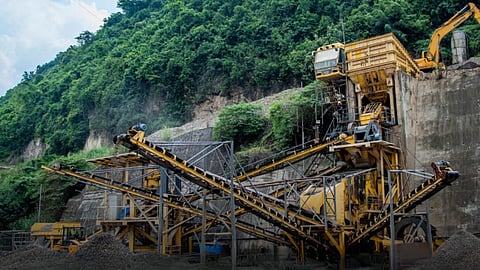
- NEWS
- the EDIT
- COMMENTARY
- BUSINESS
- LIFE
- SHOW
- ACTION
- GLOBAL GOALS
- SNAPS
- DYARYO TIRADA
- MORE

Billions of pesos in taxpayer-funded flood control projects were awarded to a handful of contractors that have raised red flags over their capitalization, ownership structure, and track record – now putting the Department of Public Works and Highways (DPWH) under scrutiny.
President Ferdinand Marcos Jr. himself has ordered a review of several projects after visiting an unfinished P96.4-million river protection structure in Bulacan earlier this month, questioning why St. Timothy Construction Corporation had failed to complete the work more than two years past its target date.
Based on Securities and Exchange Commission (SEC) documents obtained by the DAILY TRIBUNE, St. Timothy – incorporated in 2014 with just P3.93 million in capital – has since grown to P1.041 billion in paid-up capital and secured P7.32 billion worth of projects under the current administration.
It is not alone. Four other firms – Legacy Construction Corporation, Alpha & Omega General Contractor & Development Corp., QM Builders, and EGB Construction Corp. – have joined St. Timothy in cornering the lion’s share of flood control contracts from July 2022 to May 2025. Together, they account for more than P40 billion across 533 projects.
Marcos earlier disclosed that these five are part of 15 contractors that collectively cornered P100 billion worth of projects – equivalent to about 20 percent of all flood control works nationwide. The concentration of contracts among a handful of players has fueled concerns of favoritism and irregularities in DPWH’s procurement process.
Legacy Construction Corporation, founded in 2016 with only P12.5 million in capitalization, has since expanded to P600 million and secured the biggest allocation – P9.56 billion for 132 projects nationwide. It is led by brothers Alex and Raymond Abelido, who own 85 percent of the company.
Alpha & Omega General Contractor & Development Corp., also controlled by the Discaya family, followed the same path as St. Timothy. From just P3.93 million in capitalization in 2014, it likewise ballooned to P1.041 billion in paid-up capital – an identical leap to its sister company. Under Cezarah Rowena Discaya, who owns 94 percent, Alpha & Omega has bagged P7.73 billion worth of projects.
EGB Construction Corp., owned by the Baggao family of Isabela, was incorporated only in 2021 with P260 million capital. By 2025, it had expanded to P900 million and secured P7.98 billion worth of projects across Luzon.
But it is QM Builders that has sparked the sharpest criticism. Despite earning P7.38 billion for 93 projects, the Cebu-based company still reports only P1.25 million in capitalization – the same amount it declared when incorporated in 2014.
Senator Sherwin Gatchalian has warned that undercapitalized firms like QM Builders should never have been awarded multi-billion peso contracts.
“My point is that the DPWH has been awarding contracts to corporations that are undercapitalized based on the PCAB (Philippine Contractors Accreditation Board),” Gatchalian said in Filipino.
“So we want to go to the root cause of why these projects are being substandard. Because the contractors are not adequately capitalized, so they are also substandard.”
He pointed out that under PCAB rules, a winning contractor must have at least P1 billion in net worth to bid for projects worth P450 million and above.
“In my opinion, there’s some form of collusion or some form of corruption in awarding the contracts to contractors who are not capitalized adequately,” he added.
A former DPWH insider, speaking on condition of anonymity, went further: “Everyone inside knows which firms are favored. Some of these companies practically came out of nowhere, yet they suddenly have billions in contracts. That doesn’t happen by accident.”
With more than P40 billion at stake, the President’s public rebuke of St. Timothy may be only the beginning. Sources inside Malacañang told the DAILY TRIBUNE that the Palace is considering a deeper probe into how flood control contracts were awarded, whether bidding rules were strictly enforced, and if politically connected firms were favored.
As one industry observer put it, “The irony is that while contractors are swimming in government deals, Filipinos are literally drowning,” arguing that the scandal highlights a bigger problem: flood control funds may be enriching contractors more than protecting communities.
For now, what remains clear is that despite the billions flowing into flood control projects, many communities remain under water every rainy season – while the contractors behind the projects continue to rake in government deals.
